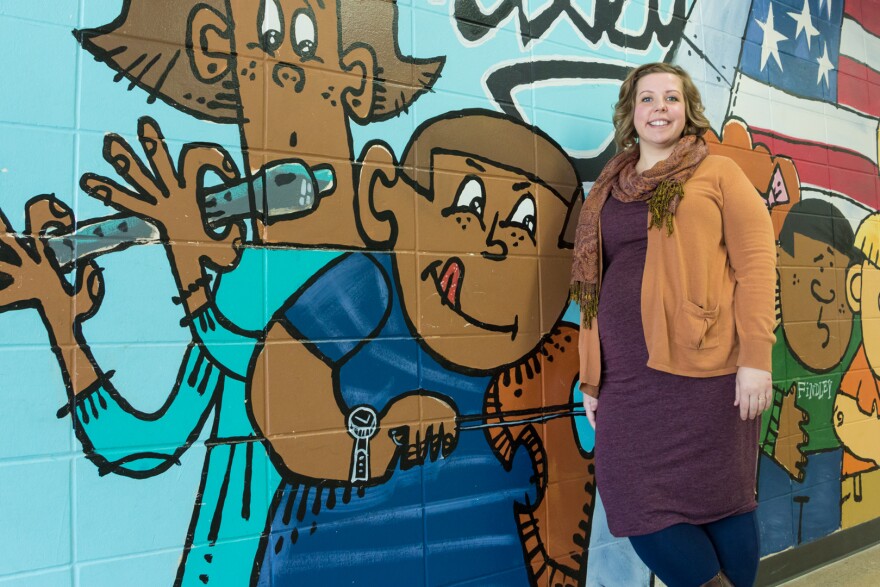At Findley Elementary School in Des Moines, art teacher Lisa Hesse begins her morning class by standing with her students in a circle as relaxing music plays.
The music is a cue for the fourth-graders to calm down as they enter. “Take a deep breath to show your voice is in control,” Hesse tells her students. “Close your eyes. When you’re ready, reach out and find a focal point.” Hesse is using a behavior management technique known as the drama contract. “They basically show that they’re in control of their body, their mind, their imagination, and their voice,” says Hesse. “And they walk through all the steps together as a team, and we show cooperation at the end and that just sets us up for every class.”
Teachers at Findley Elementary learned how to do this three years ago when they became one of eight schools in the country to test a new program called Turnaround Arts. This initiative was developed by the President’s Committee on the Arts and the Humanities for low performing schools. In 2011, Findley was ranked in the bottom 5% of Iowa schools. Now an independent study says math proficiency has increased by 17%, reading has improved by 52%, and a there’s been a 35% reduction in disciplinary referrals at this once troubled school.
Sarah Dougherty, former Art teacher at Findley, is the Turnaround Arts Program Director for Des Moines Public Schools. She says the problem wasn't a result of teachers not working hard, it was that they worked hard in isolation. Rather than change a school’s curriculum, Turnaround Arts encourages teachers to find ways to integrate art, music, and drama with math, science, and history classes.

“By infusing the arts throughout our building, and asking students not only to define things or to apply understanding, but then to create something new from that understanding, we’ve raised the bar for all of our students and so as expectations have risen through the arts, so has our performance,” says Dougherty.
As art teacher Lisa Hesse’s students finish their assignment of sculpting a monster out of clay, she is preparing them for the next step. Write a story about their creation. She says to make it work, she must talk with their teachers to see what writing skills they are using. “So that I can mirror those in my own classroom,” says Hesse. “If adjectives is a really strong portion of their curriculum at the time, then I’m going to ask them to use a lot of adjectives within their writing so that students can see the connections between the two.”
Turnaround Arts training encourages teachers to also use kinesthetic techniques, where learning happens as the student physically performs. Fourth-grade teacher Schelsy Smith says she may ask a child to act out part of a history lesson, or strike a pose to demonstrate what a word means. “We know that if we’re going to do vocabulary that week, we’re going do a tableaux,” says Smith. “Because the kids know how to bring that word to life.”

With an arts integration specialist, teachers decide how much music, painting, or acting to incorporate into their classes and regularly share their results with the rest of the staff. Last fall, Turnaround Arts expanded to 30 more schools across the country. Four of them are on the north side of Des Moines. Program Director Sarah Dougherty says this is part of a long term plan.
“So all of the schools who are implementing this in Des Moines, feed into Harding Middle School," says Dougherty. “How do we set up a pipeline for success through the arts from kindergarten at least through middle school through graduating successfully from North High School?”
As for the hundreds of Iowa schools not in Turnaround Arts, Dougherty says adding Fine Arts as a subject to Iowa’s Core Standards, will encourage more arts integrated education. She says Findley Elementary improved after the staff’s mindset was changed about using the arts to collaborate with academics.
On today's Talk of Iowa, host Charity Nebbe speaks with Dougherty, and a parent and teacher of Findley elementary, about the program's implementation and expansion. Michael Posner, Professor Emeritus of Psychology at the University of Oregon, joins the conversation to discuss arts training's affect on the brain.




